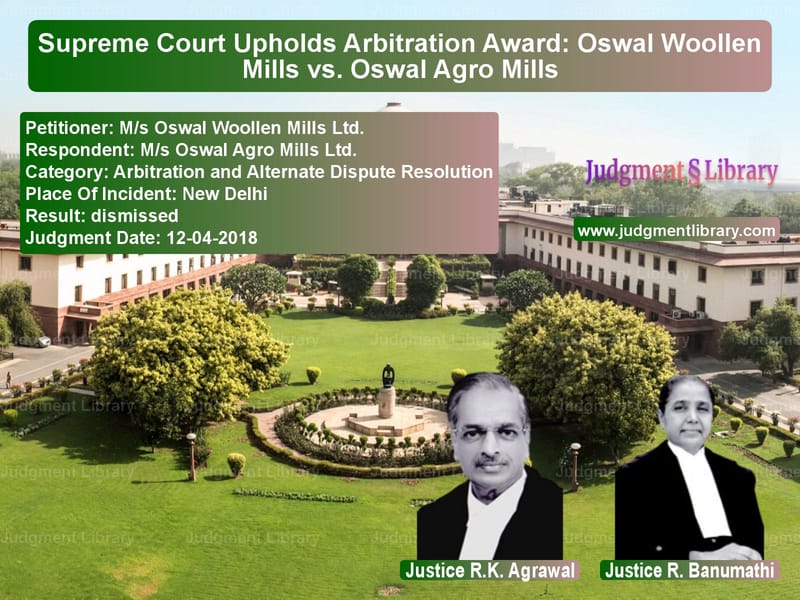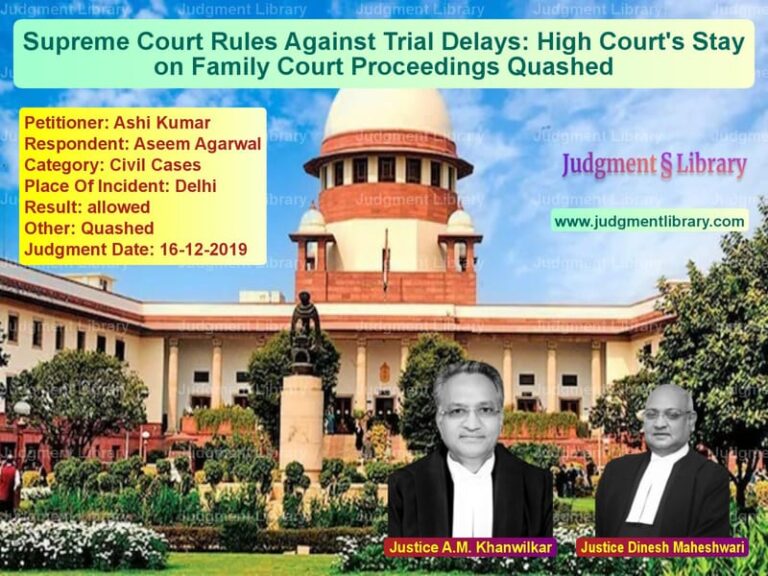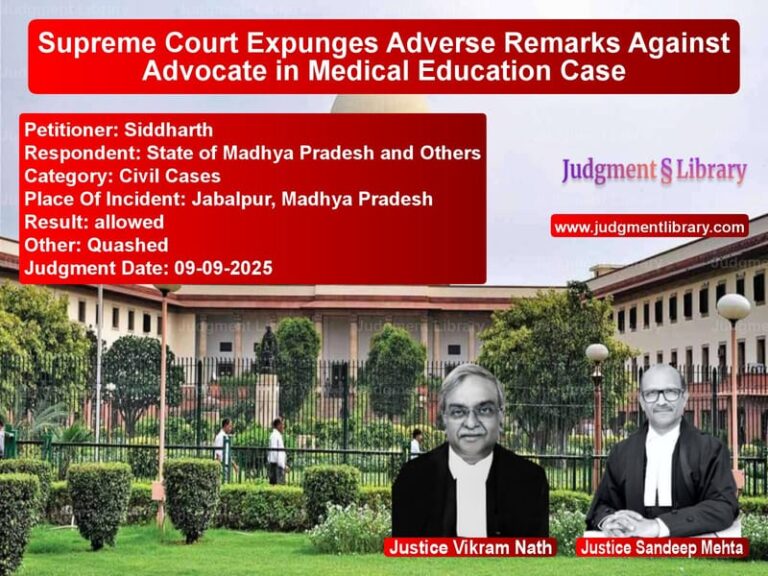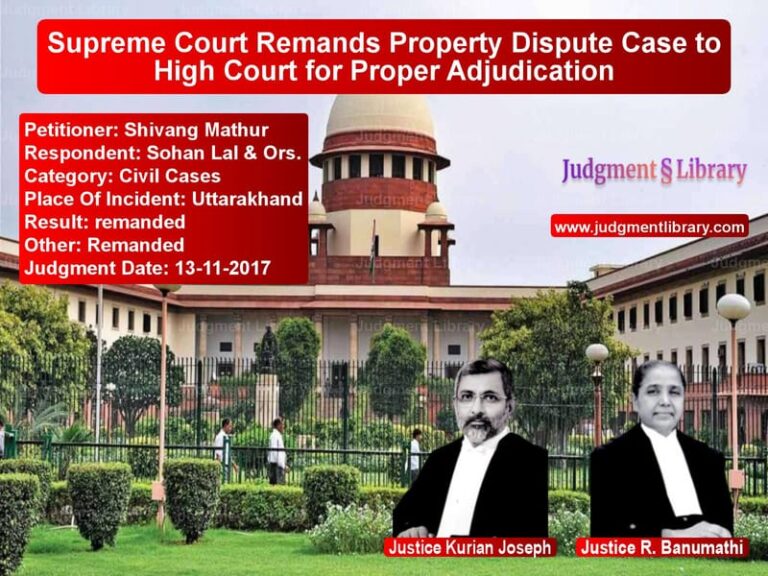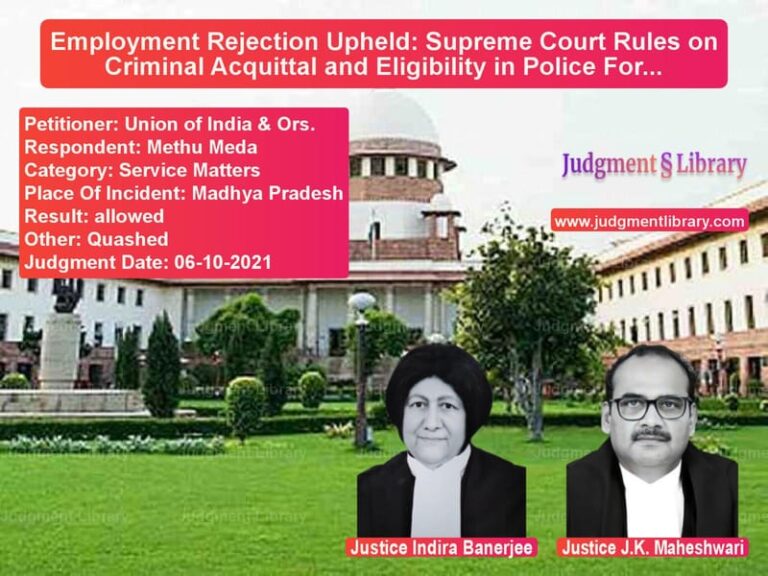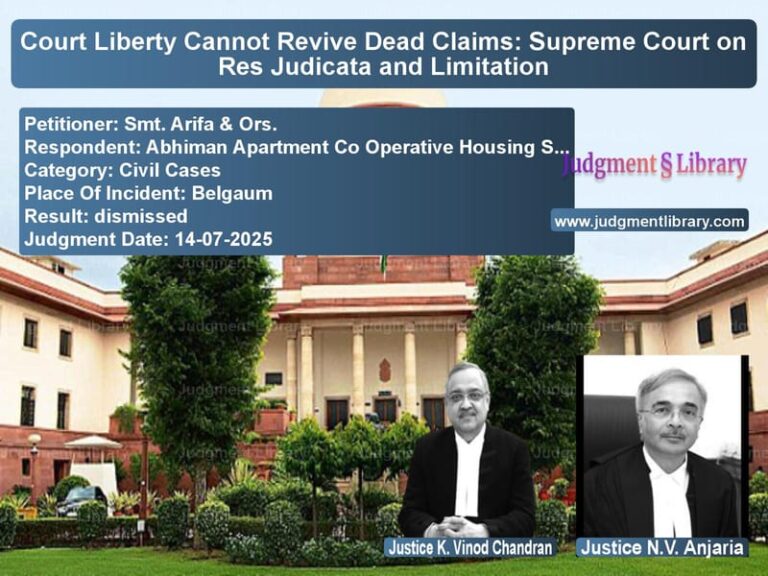Supreme Court Upholds Arbitration Award: Oswal Woollen Mills vs. Oswal Agro Mills
The Supreme Court of India recently ruled on a significant arbitration dispute in M/s Oswal Woollen Mills Ltd. v. M/s Oswal Agro Mills Ltd.. The case revolved around whether an arbitration umpire was required to conduct proceedings de novo upon taking over from arbitrators who had failed to reach a consensus. The Court upheld the arbitration award favoring Oswal Agro Mills, rejecting the plea for fresh hearings.
Background of the Case
The dispute arose from a contract between Oswal Woollen Mills Ltd. (Appellant) and Oswal Agro Mills Ltd. (Respondent), both engaged in manufacturing and trading activities. The agreement dated March 30, 1982, appointed Oswal Agro Mills as an agent to assist Oswal Woollen Mills in importing materials under the Handbook of Import-Export Procedure, 1981-82.
Key facts:
- The agreement allowed Oswal Agro Mills to import materials worth Rs. 1,85,95,100, with a 5% commission on the cost, insurance, and freight (CIF) value.
- However, goods worth Rs. 69,94,300 could not be imported due to the absence of required REP licenses, leading to a contractual dispute.
- Both parties referred the dispute to arbitration under the Arbitration Act, 1940.
- The arbitrators failed to reach a consensus, and the matter was referred to an umpire.
- The umpire ruled in favor of Oswal Agro Mills, awarding Rs. 64,65,782 with 18% interest from November 1, 1991, until realization.
Petitioner’s (Oswal Woollen Mills) Arguments
- The petitioner argued that the umpire must conduct proceedings de novo (afresh), including recalling witnesses and re-examining evidence.
- The company cited Article 4 of the First Schedule to the Arbitration Act, which states that the umpire enters arbitration “in lieu of the arbitrators.”
- It contended that unless an umpire hears the matter de novo, the decision would be biased as the umpire would rely on proceedings conducted by the arbitrators.
- The petitioner also claimed that damages for unimported goods were untenable, as the contract only provided for commission on imports.
Respondent’s (Oswal Agro Mills) Arguments
- The respondent argued that the petitioner had waived the right to demand a de novo hearing by participating in umpire-led proceedings without objection.
- The petitioner filed an application for a fresh hearing only after final arguments had concluded.
- The umpire’s role was to continue from the stage of disagreement and not restart the process.
- The damages awarded were justified, as Oswal Woollen Mills had breached the contract by failing to secure the required licenses.
Supreme Court’s Observations
The Supreme Court analyzed the legal framework under the Arbitration Act, making several key observations:
- “An umpire steps into the shoes of the arbitrators and continues proceedings from the point of disagreement. A fresh hearing is necessary only if a party requests it at the earliest stage.”
- “The petitioner engaged in umpire-led proceedings without raising an objection until the final stage, thereby waiving its right to demand a de novo hearing.”
- “Arbitration proceedings must be conducted efficiently. Permitting a de novo hearing every time arbitrators fail to agree would undermine the purpose of arbitration.”
- “Damages for unimported goods were justified, as the contract implicitly required Oswal Woollen Mills to facilitate the necessary import licenses.”
Key Legal Precedents Considered
- Ravindra Kumar Gupta & Co. v. Union of India (2010) – Reaffirmed that courts should not interfere with arbitration awards unless they violate fundamental legal principles.
- Municipal Corporation of Delhi v. Jagan Nath Ashok Kumar (1987) – Stated that arbitrators have discretion in evaluating evidence and courts should not re-examine facts.
Final Judgment
The Supreme Court dismissed the appeal, upholding the Delhi High Court’s ruling in favor of Oswal Agro Mills. The Court ruled:
“An umpire is not required to start arbitration afresh. A party that fails to demand a fresh hearing at the outset cannot later claim procedural unfairness.”
The Court also upheld the damages awarded, including 18% interest from 1991, noting that the delay was caused by the petitioner’s attempts to relitigate the issue.
Significance of the Judgment
This ruling has critical implications for arbitration law:
- Limits on De Novo Hearings: Umpires are not required to restart arbitration unless a party requests it at an early stage.
- Waiver by Conduct: A party that engages in umpire-led proceedings without objection cannot later demand fresh hearings.
- Judicial Restraint in Arbitration Awards: Courts will uphold arbitration awards unless there is a clear violation of legal principles.
Conclusion
The Supreme Court’s decision in this case reinforces the principle that arbitration must be conducted efficiently and fairly. By upholding the arbitration award, the Court has set an important precedent ensuring that procedural objections cannot be used as a tool for delaying dispute resolution.
Petitioner Name: M/s Oswal Woollen Mills Ltd..Respondent Name: M/s Oswal Agro Mills Ltd..Judgment By: Justice R.K. Agrawal, Justice R. Banumathi.Place Of Incident: New Delhi.Judgment Date: 12-04-2018.
Don’t miss out on the full details! Download the complete judgment in PDF format below and gain valuable insights instantly!
Download Judgment: Ms Oswal Woollen Mi vs Ms Oswal Agro Mills Supreme Court of India Judgment Dated 12-04-2018.pdf
Direct Downlaod Judgment: Direct downlaod this Judgment
See all petitions in Arbitration Awards
See all petitions in Contract Disputes
See all petitions in Enforcement of Awards
See all petitions in Judgment by R K Agrawal
See all petitions in Judgment by R. Banumathi
See all petitions in dismissed
See all petitions in supreme court of India judgments April 2018
See all petitions in 2018 judgments
See all posts in Arbitration and Alternate Dispute Resolution Category
See all allowed petitions in Arbitration and Alternate Dispute Resolution Category
See all Dismissed petitions in Arbitration and Alternate Dispute Resolution Category
See all partially allowed petitions in Arbitration and Alternate Dispute Resolution Category

